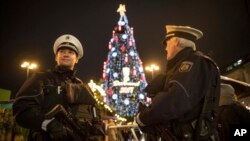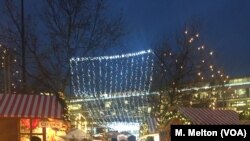Germany's Christmas markets opened Monday at the start of the holiday season, with security staff on hand and concrete barriers to protect shoppers, nearly a year after an Islamist militant killed 12 people by driving a truck into crowds.
Some 2,600 markets, known for their sparkling Christmas trees and wooden stalls serving candied nuts, sausages, mulled wine and handicrafts, opened across Germany under tighter-than-usual security. The markets are beloved by Germans and a major tourist attraction for visitors this time of year.
In the city of Bochum in Western Germany, organizers decorate concrete bollards, wrapping them up as Christmas presents with bows to make them appear festive.
In Photos: Germany's Christmas Markets Open a Year After Attack
In Berlin, Petra Henne, who had been at the market in December last year just half an hour before Tunisian militant Anis Amri drove a hijacked truck into the crowd, came out for the opening this year to enjoy the festivities.
The extra security was "a bit oppressive," she said. "And it is awful, this violence that you can't do anything about. But Berliners are on good form and they carry on anyway. What else can one do?"
An interior ministry spokesman said the risk of an attack in Europe and Germany is "continuously high."
Organizers and business owners had complained that the government was reluctant to share the cost of extra security measures.
"What could be done was done," said Berlin's Mayor, Michael Mueller, on Monday, noting that those measures still could not guarantee absolute security.
The Alternative for Germany (AfD) far-right party asked members of the public to share pictures showing extra security measures at their local markets and post them on social media in protest against Chancellor Angela Merkel's decision in 2015 to open Germany's borders to more than a million asylum seekers.
The AfD blames Merkel's immigration policy for what it says is a rise in crime and Islamist attacks.
Klaus Schultheis, an expert in German Christmas markets who collects annual national data on the subject, said he knew of only two markets that were cancelled over security concerns.
"Christmas markets are a piece of the German culture that shouldn't disappear no matter what," he said. "It goes on."






